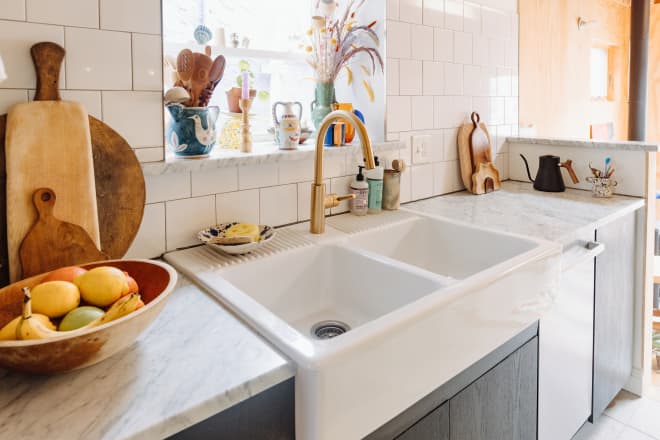13 Commonly Used Words in Real Estate Listings That Are Usually Red Flags

There’s a psychology to selling a house. From pricing strategies designed to inspire bidding wars to careful staging that helps you see yourself already living there, real estate agents know that selling a house is as much about selling a lifestyle as a piece of property.
That process starts long before you actually show up to look at a house—way back when the real estate agent writes up the property listing. We all know that listing descriptions are marketing copy, but even if you read them with a skeptical eye, you might not spot some of the misleading words and phrases peppered in there because they seem so innocuous. Most of these hidden red flags aren’t exactly lies—they’re just efforts to obscure the truth with softer vocabulary. Here’s what to look for.
The red flags
Real estate pros use language artfully. The “red flag” words don’t always jump out at you, but you can look for any phrases that seem out of place or overly poetic. Here are some of the most common terms real estate professionals use to make a bad listing look worth your time.
Cozy. Probably the most over-used word in real estate listings, “cozy” is weaponized to conjure up images of comfort and familiarity. But any real estate pro will tell you that “cozy” really means just one thing: small. Sometimes the placement of the word can give you some hints—for example, if it’s a “cozy garden,” the house itself might be spacious enough.
TLC/Handyman’s special. These terms both evoke easy, low-effort transformations—a lick of paint, maybe some new carpeting. But in real estate listings, they usually mean you’re buying a project—and probably an expensive one. No one’s going to list a house saying “needs $200,000 in renovations,” after all.
Convenient location. Look for what it’s supposedly conveniently located near. Easy access to main roads could mean there’s an on-ramp right nearby. Local bars and restaurants? In that case, “convenient” translates to “noisy.” What you’re really looking for is “walking distance.” Things are only convenient when they don’t adversely affect your life when you’re not using them.
Unique. This word implies that you’re getting something special, unlike all the cookie-cutter condos that otherwise litter the market. And maybe you are, but it’s often used to describe homes that are difficult to sell due to design elements that most people don’t like. Barbara Corcoran told CNBC that "unique" was “the worst word in all real estate copy,” which means “nobody wants it.”
Quiet. This might seem perfectly reasonable—people do often want peace and quiet in their homes. But seeing this word in a listing should prompt some questions about why the agent felt the need to underscore that aspect of the property. Often this is included because the property is in a noisy area, so stressing that it has good windows and you can’t hear all that traffic or crowd noise when you’re trying to sleep can head off concerns. If "quiet" is also one of the first things mentioned, that might imply that it’s the sole selling point of the place.
Charming. This classic is almost not even a code word anymore—most people understand that it usually means "old." In the absence of the words "renovated" or at least "updated" (see below), this probably means it’s a time capsule that will require some work.
Vibrant. This word paints a picture of a cool, hip neighborhood filled with people from all over. What it usually means, though, is "loud."
Original condition. Context matters here. If specific architectural or design elements are in original condition, that could be a wonderful detail. If the whole place is in original condition, that could just mean that literally everything from the wallpaper to the plumbing is 75 years old and in desperate need of replacement.
Green belt. This one is tricky, as it’s factual, but crucial information is often omitted when it appears in a listing. A green belt is desirable because it’s a patch of nature that can’t be developed, so if the lot backs up to a green belt, you’ll potentially have a gorgeous, unspoiled view and possibly access to some wilderness without the threat of someone developing the land into an eyesore. But greenbelts aren’t always nature preserves—they often obscure power lines or other infrastructure, so finding out the purpose of the green belt is essential.
Updated. This word works hard to make a run-down place feel fresher. If a house is renovated, the listing will say renovated, and probably go into detail about the quality of the work and materials. "Updated," on the other hand, usually means that some things have been replaced—new carpeting, new appliances, one of the three bathrooms. But these updates often come at different times, usually have no coordinating design, and can leave a house feeling patch-worked and not cohesive.
Generous (size). There aren’t any standards when it comes to describing the size of things in a house, and the word "generous" is so open to interpretation as to be useless. It feels big, though—if you get a "generous" portion of something, it’s big, right?—so it’s often deployed when the rooms or other aspects of the property are actually average size to embiggen the place and make it seem grander.
Motivated. This word hooks into our greed and desire for a deal: If the buyer’s motivated, you can lowball on the offer and demand concessions! But it’s worth asking yourself (or, better, the listing agent) why they’re motivated. Has the house been on the market for months, but they can’t sell it because of defects (that you will have to fix)?
Well-maintained. This innocuous phrase sounds great—no one wants a house that isn’t well-maintained. Except that well-maintained is kind of the baseline for a property. Stressing this usually means that the house hasn’t been renovated, remodeled, or significantly improved in a long time. Sure, everything works, but you’re probably going to spend money in the near future to bring it out of the last century.
Spotting one or more of these hidden red flags in a property listing doesn’t necessarily mean the place isn’t worth looking at—but it does mean you should be prepared to dig into the reality behind the marketing copy.
What's Your Reaction?
 Like
0
Like
0
 Dislike
0
Dislike
0
 Love
0
Love
0
 Funny
0
Funny
0
 Angry
0
Angry
0
 Sad
0
Sad
0
 Wow
0
Wow
0












































